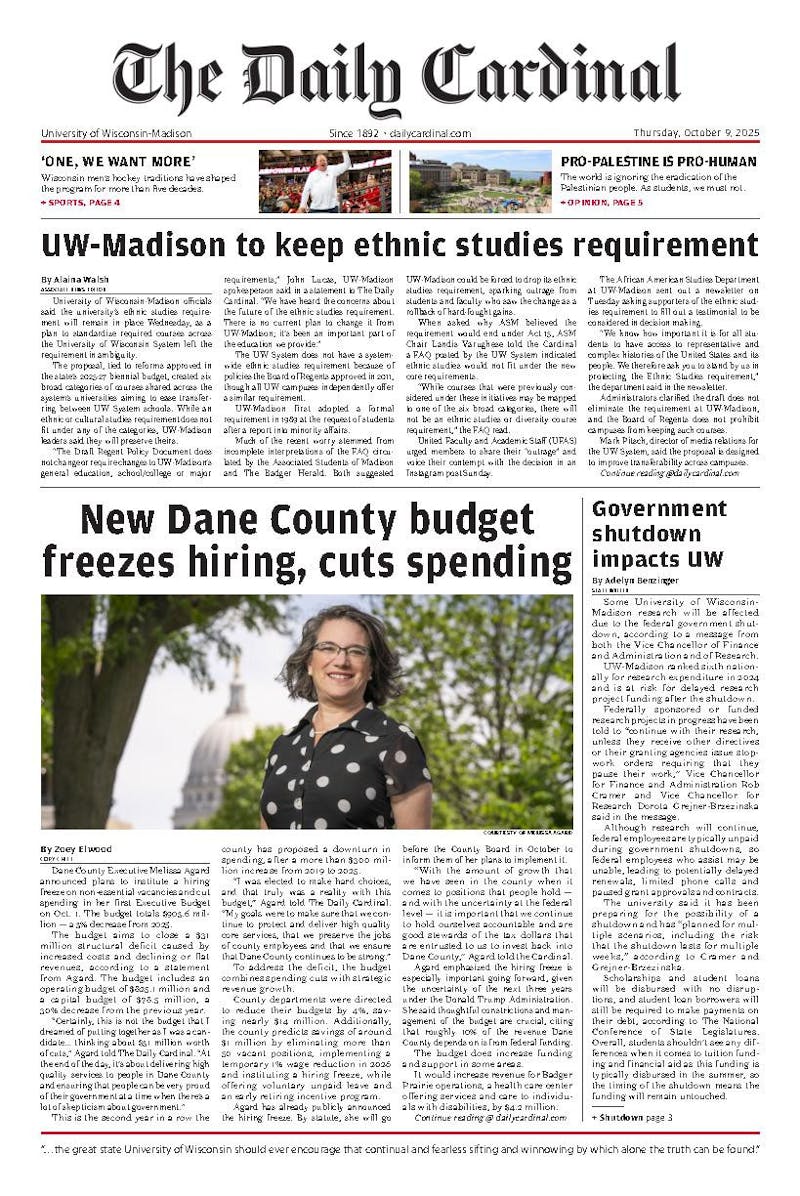Community, healthy choices at heart of Slow Food UW
Every Monday night, community members gather in the basement of the Crossing church on University Avenue to enjoy Family Dinner Night hosted by the organization Slow Food UW.
The dinner, which costs $5 and is prepared by student interns and a different guest chef every week, is just one part of the organization’s efforts to demonstrate the ways food can bring people together.
Founded in 1989, Slow Food is an international movement working to prevent the disappearance of local food cultures and traditions.
The organization aims to “combat people’s dwindling interest in the food they eat, where it comes from and how our food choices affect the world around us,” according to its website.
UW’s campus chapter of Slow Food brings this mission to the Madison community.
The organization offers affordable, healthy meals to college students, brings healthy food and information to children in South Madison and partners with other campus organizations to spread its message. The group’s vision statement says its events attempt to create an inclusive, anti-oppressive space “where community members can bridge cultural differences through a shared meal.”
Scott Lawson, a current Slow Food cook, echoed the welcoming sentiment. “It’s hard to be mad at people when there is food involved,” he said.
Family Dinner Night hosts a diverse range of community members each week, where strangers sit side by side to share a meal.
Slow Food UW also offers a café-style lunch Wednesday afternoons, featuring seasonal fruits and vegetables and working to eliminate food waste by sending leftovers down the street to Porchlight homeless shelter.
Besides serving the campus community, Slow Food UW also brings its services to South Madison to connect with children and their families.
The Slow Food South Madison project serves a locally-sourced meal once a month at the Boys and Girls Club, as well as holding cooking workshops to teach children how to prepare healthy and affordable food.
“South Madison bridges the gap between the rest of Madison and the campus community,” said Krista Marshall, a UW-Madison student currently interning with Slow Food. “They address specific problems in the food system, and bring knowledge we gain from FDN and Café to economically disparaged areas.”
Through its variety of projects, Slow Food UW tries to provide “good, clean, and fair food for all.”
“Students need to be more aware of what they’re eating and what that means,” Lawson said. “It is easy in our campus bubble to eat healthy, sustainable, local meals all of the time.”
By providing students with access to sustainable food, Slow Food UW attempts to raise student awareness about food injustice and the interconnectedness of food and social injustice.
Marshall said this is something she has learned a lot about since joining the Slow Food team.
“Knowledge is power when it comes to your food system,” Marshall said. “It is important to know where your food comes from.”
Student farm seeks to bridge gap between food production, consumption
Off the path on the way to Picnic Point, in the Eagle Heights garden, a 1.8-acre student-run farm serves as home to a variety of fruits, vegetables, flowers and herbs.
The farm practices sustainable and organic techniques to produce crops enjoyed by the entire UW-Madison community. Operated by the organization F. H. King Students for Sustainable Agriculture, the farm’s student workers pride themselves in running a space which focuses mostly on sustainable and organic farming.
The students try to minimize the amount of pesticides and herbicides used, as well as the general energy utilized in the production of the crops.
Garden Director Aida Ebrahimi explained the farm is considered a permaculture, meaning there is a wide variety in the types of crops grown.
“The diversity of crops will create a healthier environment, so we will have a lower amount of pests and diseases spreading in the garden,” Ebrahimi said.

“It’s a diet that sustains a person throughout the day, one that is healthy and is comprised of mostly locally grown and in season vegetables,” Ebrahimi said.
F.H. King’s Finance Director Erin Daly said she realizes many students feel they are unable to sustain such a diet.
“They think it’s too hard to get the food or the food is just too expensive on a college budget, but that is just not the case,” Daly explained.
The club leads workshops which center around different topics involving food, used to give students insight into ways to lead a healthier and more sustainable lifestyle on a college budget.
According to Daly, some solutions they suggest to students are to find grocery stores with a section of bruised produce which, though still healthy and fresh, are a cheaper alternative to the normal selection.
To ensure that fresh vegetables are available to more students, the organization has also developed a program called Harvest Handouts, which gives fresh produce out to students completely free of charge during the months of June to October.
According to the organization’s website, 90 percent of the 4,000-5,500 pounds of vegetables produced on the farm are distributed on Fridays with the Harvest Handout program.
The rest of the produce is usually donated to other events or served at their community dinners, held once a month over the summer.
Daly explained Harvest Handouts and their other events allow for fresh produce to be accessible to more students.
“It’s nice to know we’re reaching a wide number of people,” Daly said. “It’s cool to see the look on their face and see how grateful they are when they get the vegetables.”
Many of the farm’s events also intend to close the gap between food production and food consumption. According to Ebrahimi, there is often a disconnect between students and their source of food.
“Lots of students don’t understand how the food they are eating was grown, how it was processed or how it came onto their table,” Ebrahimi said. “It’s a matter of self-care to really understand what’s going into your body.”






